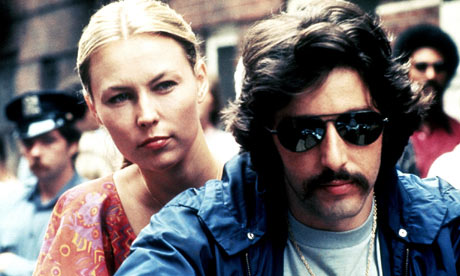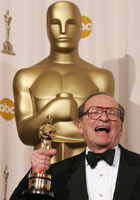I began thinking about essaying something on Lumet. Nothing involved, since work and family leave no time for that. Rather, just a list of favorite films with a few notes on their peculiar charms and intensities. As I reviewed web filmographies, I came across this obituary, which seemed fairly useful. Whether I will get a chance to write something on Lumet is still an open question. So the "primary" sources must stand for themselves.
Jay
___________________________________________________________
Sidney Lumet obituary
Prolific film director with a reputation for exploring social and moral issues

Sidney Lumet, who has died aged 86, achieved critical and commercial success with his first film, 12 Angry Men (1957), which established his credentials as a liberal director who was sympathetic to actors, loved words and worked quickly. For the bulk of his career, he averaged a film a year, earning four Oscar nominations along the way for best director, for 12 Angry Men, Dog Day Afternoon (1975), Network (1976) and The Verdict (1982).
It is arguable that, had he not been so prolific, Lumet's critical reputation would have been greater. Certainly, for every worthwhile film there was a dud, and occasionally a disaster, to match it. But Lumet loved to direct and he was greatly esteemed by the many actors – notably Al Pacino and Sean Connery – with whom he established a lasting rapport.
The majority of his films were shot not in Hollywood, but in and around New York. Lumet's book Making Movies (1995), a lucid account of all aspects of the film business, used his own works for textual analysis and included a coda, almost a lament, in which he railed against the studios' interference. He had become increasingly aware that there was little space, even in his beloved New York, for works inspired by social commitment and passion, less still for those derived from great plays and literature.
 Sidney Lumet with his honorary Oscar in 2005. 'If you prayed to inhabit a character,' said Al Pacino, 'Sidney was the priest who listened to your prayers, helped them come true' Photograph: Getty Images
Sidney Lumet with his honorary Oscar in 2005. 'If you prayed to inhabit a character,' said Al Pacino, 'Sidney was the priest who listened to your prayers, helped them come true' Photograph: Getty Images His diatribe echoed the words of the character played by Peter Finch in Lumet's Network, a black comedy written by Paddy Chayefsky. Finch, portraying a television executive, screams defiance at the banality and excesses of the medium, just as Lumet – somewhat more subtly – would express his disillusionment with the studios' obsession with infantile blockbusters that made a mockery of serious directors such as himself. He was a consummate professional, a courteous and cultured individual destined by upbringing and intelligence to enter the theatre.
He was born in Philadelphia to Eugenia Wermus and Baruch Lumet, distinguished Yiddish theatre actors, and was only a few years old when he first acted on stage and on the radio. He appeared in the film One Third of a Nation (1939) and had several roles on Broadway, including a performance as Jesus, in the play Journey to Jerusalem, staged in 1940. After attending Columbia University, Lumet was in the US army signal corps during the second world war, and served in Burma and India.
His immediate postwar career was in the theatre, as an actor and a director, until he joined the CBS network in 1950 as a trainee television director. During this golden era of live drama, working alongside directors including Delbert Mann, Robert Mulligan and John Frankenheimer and the writers Reginald Rose and Chayevsky, he amassed hundreds of credits.
It was Rose's courtroom drama 12 Angry Men – which had previously been aired on TV – that launched Lumet's cinema career, with Henry Fonda as the producer and in the lead role, as a sceptical juror in a murder trial. Lumet moved quickly to a second film with Fonda, Stage Struck (1958), but neither that unconvincing portrait of life in the theatre, nor the rather better That Kind of Woman (1959), starring Sophia Loren, substantially enhanced his career.
The Fugitive Kind (1960), written by Tennessee Williams, now seems noteworthy only for the mismatching of Marlon Brando with Anna Magnani. A Franco-Italian production, Vu du Pont (1962), adapted from Arthur Miller's A View from the Bridge, was controversial for the time because of its homosexual theme, but now looks impossibly dated.
However, Lumet re-established his career with another theatrical adaptation. His 1962 film of Long Day's Journey Into Night by Eugene O'Neill starred Ralph Richardson and an Oscar-nominated Katharine Hepburn. He compounded that film's success with a nuclear-age nightmare, Fail Safe (1964), with Fonda heading a starry cast and battling, as the US president, to save the world, while American planes head, by mistake, into Soviet territory. A kind of Dr Strangelove without the black humour, Fail Safe reflected Lumet's serious nature.
Nowhere was this sombre tone more evident than in The Pawnbroker (1964), about a Jewish businessman (Rod Steiger) haunted by his memories of the holocaust, and The Hill (1965), starring Connery, which was set in a north African detention centre during the second world war. The Hill, made in black and white and with no music, was one of a handful of films Lumet shot in Britain.
He returned to New York, where he made an elegant version of Mary McCarthy's novel The Group (1966), notable for its fine ensemble playing. Back in the UK, he directed a gloomy version of John le Carré's Call for the Dead, retitled The Deadly Affair (1966), with a great performance by James Mason, lost in a foggy London and an impenetrable plot. Mason also dominated Lumet's sturdy 1968 film of Chekhov's The Seagull.
After joining Joseph L Mankiewicz to compile a documentary about Martin Luther King, he made the brilliant caper The Anderson Tapes (1971) with Connery, his favourite actor. Lumet once told me that whenever he received a screenplay, he looked to see whether there was a part for Connery. He was also cast in The Offence (1972), as a policeman who is so affected by the horrors of his work that he becomes the predator. In Lumet's film of Murder On the Orient Express (1974), probably the best screen adaptation of an Agatha Christie story, Connery was among an all-star cast including Lauren Bacall, John Gielgud, Ingrid Bergman and, as the detective Hercule Poirot, Albert Finney.
No doubt Lumet regarded that particular box-office hit as less profound than Serpico (1973) and Dog Day Afternoon. The former, based on Peter Maas's non-fiction book, starred Pacino as an undercover New York police officer who is surrounded by corruption on the force but is determined to play straight. The latter, also based on a true story and again starring Pacino, in a particularly mesmerising performance, revolved around a botched bank robbery and was shot on the streets of New York, with fierce improvised dialogue.
Lumet had another hit with Network – which was nominated for a total of 10 Oscars and won four – but then faltered with a turgid version of Peter Shaffer's play Equus (1977) and the risible The Wiz (1978), an African-American version of The Wizard of Oz, starring Diana Ross. Only Michael Jackson (as Scarecrow) and Lena Horne (as Glinda the Good) redeemed that farrago.
Horne's daughter Gail Jones was Lumet's third wife. He had previously been married to the actors Rita Gam and Gloria Vanderbilt. After he and Jones divorced, he married Mary Gimbel in 1980. The following year, he returned to his preoccupation with corruption and the police, directing and co-writing the factually based Prince of the City. This long, serious work was unjustly neglected – despite an Oscar nomination for best adapted screenplay – but remained a personal favourite for Lumet.
He worked with David Mamet on The Verdict (1982), an expose of legal malpractice, eliciting a driven performance from Paul Newman as an alcoholic lawyer and a masterly one from Mason as his adversary. Daniel (1983), an adaptation of an EL Doctorow novel, was another labour of love for the director yet failed to engage the public, remaining only a tribute to Lumet's tenacity and integrity.
The Morning After (1986) proved to be an unusual film for Lumet as it was made in Hollywood, rather than on location in New York. Starring Jane Fonda as a drunken actor involved in a killing, it was a moderate success, although Lumet far preferred Running On Empty (1988), in which River Phoenix played the son of political activists hotly pursued by the FBI. That film combined three of Lumet's obsessions – politics, the family and justice. These themes returned in Family Business (1989), starring Connery, Dustin Hoffman and Matthew Broderick; Q&A (1990), with Nick Nolte as a bigoted cop; A Stranger Among Us (1992), a quasi-documentary portrait of a Hasidic Jewish community in Brooklyn; and Night Falls On Manhattan (1996), which had echoes of 12 Angry Men and The Verdict but suffered from lacking the spark of originality. Despite respectable notices in the US, it failed at the box office.
Lumet moved on to Critical Care (1997), which he described as a "no-budget black comedy". Life was not getting any easier for gutsy, cultured, caring directors, but a little thing like no budget did not faze him. He moved the shoot to Toronto to double for the more expensive New York – that way, he said, "you pick up 17% on the exchange rate".
His next film took him back to where he was happiest, the streets of New York, for what many considered a redundant reworking of Gloria, the 1980 movie directed by John Cassavetes and starring Gena Rowlands as the gutsy, eponymous hero, who is on the run from the mob. Lumet was blessed with a bankable star, Sharon Stone, who blended glamour with tenderness in the role. In a move to keep working, he returned to television in 2001 with the series 100 Centre Street, based around the staff of a New York City courthouse. Characteristically, it was well received for its intelligence and pace.
At the Academy Awards in 2005, Lumet was presented with an honorary Oscar by Pacino. "If you prayed to inhabit a character," said Pacino, "Sidney was the priest who listened to your prayers, helped them come true." It seemed for a while that the big screen was beyond the reach and insurability of a director – however well known for his brisk and economical approach to shooting – who was in his 80s. However, in 2007 he made a brilliant return to form with the black comedy Before the Devil Knows You're Dead. The film, which followed two hard-up brothers who decide to rob their parents' jewellery store, with catastrophic results, was superbly acted under his witty and sympathetic direction.
Lumet is survived by Mary and his stepchildren, Leslie and Bailey; his daughters Amy and Jenny, from his third marriage; nine grandchildren; and a great-grandson.
• Sidney Lumet, film director, born 25 June 1924; died 9 April 2011

No comments:
Post a Comment
Comments